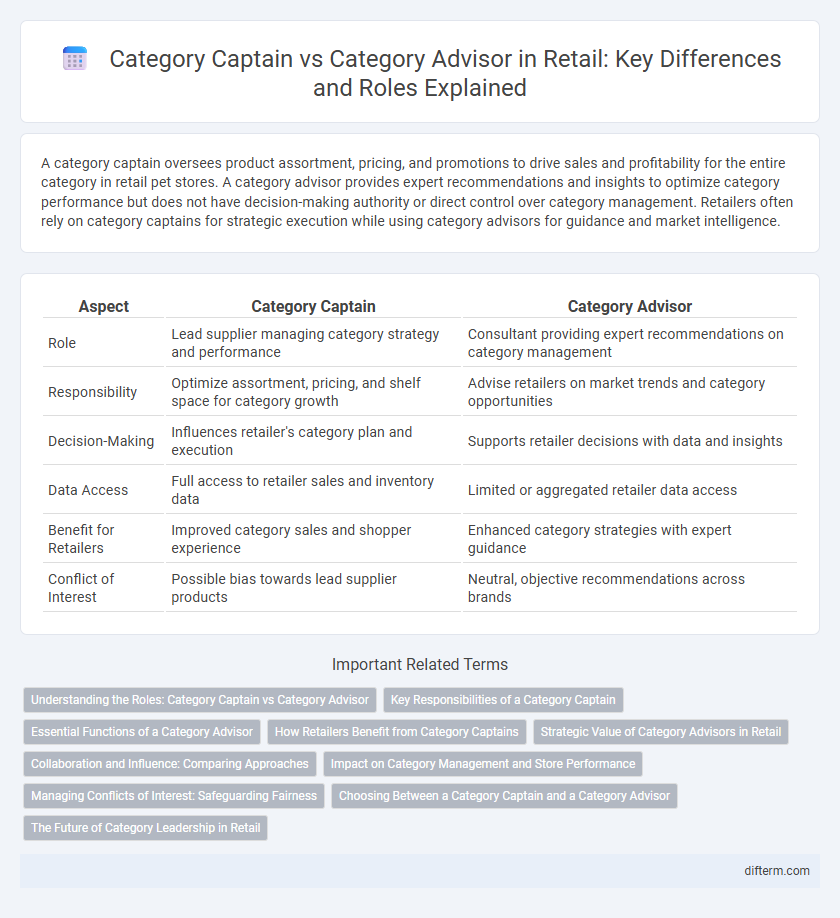A category captain oversees product assortment, pricing, and promotions to drive sales and profitability for the entire category in retail pet stores. A category advisor provides expert recommendations and insights to optimize category performance but does not have decision-making authority or direct control over category management. Retailers often rely on category captains for strategic execution while using category advisors for guidance and market intelligence.
Table of Comparison
| Aspect | Category Captain | Category Advisor |
|---|---|---|
| Role | Lead supplier managing category strategy and performance | Consultant providing expert recommendations on category management |
| Responsibility | Optimize assortment, pricing, and shelf space for category growth | Advise retailers on market trends and category opportunities |
| Decision-Making | Influences retailer's category plan and execution | Supports retailer decisions with data and insights |
| Data Access | Full access to retailer sales and inventory data | Limited or aggregated retailer data access |
| Benefit for Retailers | Improved category sales and shopper experience | Enhanced category strategies with expert guidance |
| Conflict of Interest | Possible bias towards lead supplier products | Neutral, objective recommendations across brands |
Understanding the Roles: Category Captain vs Category Advisor
Category captains lead category management by coordinating between manufacturers and retailers to optimize assortment, pricing, and promotions, driving category growth and profitability. Category advisors provide strategic insights and recommendations based on data analytics to support retailers in improving category performance without direct decision-making authority. The distinction lies in the category captain's role as a collaborative leader managing category execution versus the category advisor's focus on consultative guidance and analysis.
Key Responsibilities of a Category Captain
A Category Captain leads category management by analyzing market trends, driving sales growth, and optimizing product assortments to maximize profitability. They coordinate closely with retailers and suppliers to implement pricing strategies, promotional activities, and inventory management. Their role includes leveraging consumer insights and competitive data to enhance category performance and achieve business objectives.
Essential Functions of a Category Advisor
Category advisors play a crucial role in retail by providing data-driven insights and strategic recommendations to optimize category performance, manage inventory levels, and enhance product assortment. They analyze consumer behavior, market trends, and sales data to guide pricing, promotions, and merchandising decisions, ensuring alignment with retailer objectives. Unlike category captains who often have supplier-driven agendas, category advisors maintain an objective stance to foster collaboration and improve category profitability.
How Retailers Benefit from Category Captains
Retailers benefit from category captains through enhanced category management that leverages supplier expertise to optimize product assortments, pricing strategies, and shelf placement, driving increased sales and profitability. Category captains use detailed consumer data and market analytics to tailor promotions and inventory decisions, resulting in improved inventory turnover and reduced stockouts. Collaboration with category captains fosters stronger supplier-retailer partnerships, enabling better alignment of marketing initiatives and innovation tailored to consumer demand.
Strategic Value of Category Advisors in Retail
Category advisors deliver strategic value in retail by leveraging data analytics and market insights to optimize product assortment and pricing strategies, driving sales growth and enhancing competitive positioning. Their deep collaboration with retailers enables tailored merchandising solutions that address consumer behavior and emerging trends, resulting in improved category profitability. Unlike category captains who primarily focus on supplier interests, category advisors provide unbiased, holistic guidance that fosters long-term retail success.
Collaboration and Influence: Comparing Approaches
Category captains typically hold a leadership role, guiding retail strategies by leveraging deep insights and strong collaboration with suppliers to influence category performance. In contrast, category advisors provide expert recommendations and analysis without direct decision-making power, fostering influence through consultative collaboration with retailers. Both roles rely on effective communication and partnership, but category captains exert more direct control over category management outcomes.
Impact on Category Management and Store Performance
Category captains leverage detailed market analytics and supplier collaboration to drive category growth, optimize shelf space, and enhance product assortment, significantly improving store sales and customer satisfaction. Category advisors provide strategic insights and recommendations but have less influence over supplier negotiations and shelf management, often resulting in moderate improvements in category performance. Effective category management typically benefits more from category captains' hands-on approach, which directly impacts operational efficiency and inventory turnover.
Managing Conflicts of Interest: Safeguarding Fairness
Category captains hold significant influence over product placement and pricing strategies, which can lead to potential conflicts of interest if their own brand's products are favored over competitors. Category advisors provide impartial guidance by leveraging insights across multiple brands, helping retailers maintain balanced category management without bias. Implementing transparent governance and clear conflict-of-interest policies is essential to safeguard fairness and optimize category performance in retail environments.
Choosing Between a Category Captain and a Category Advisor
Choosing between a category captain and a category advisor depends on a retailer's strategic needs and collaboration goals. Category captains lead category management with deep data analytics and supplier partnerships, optimizing assortment and pricing to drive sales growth effectively. Category advisors provide consultative support with market insights and trend analysis, ideal for retailers seeking external expertise without ceding category control.
The Future of Category Leadership in Retail
Category captains leverage data analytics and supplier expertise to optimize product assortment and pricing strategies, driving increased sales and shelf efficiency. Category advisors focus on collaborative partnerships, providing strategic insights to align retail goals with consumer trends and market dynamics. The future of category leadership in retail emphasizes integrated roles combining data-driven decision-making with agile advisory support to enhance shopper experience and competitiveness.
category captain vs category advisor Infographic

 difterm.com
difterm.com